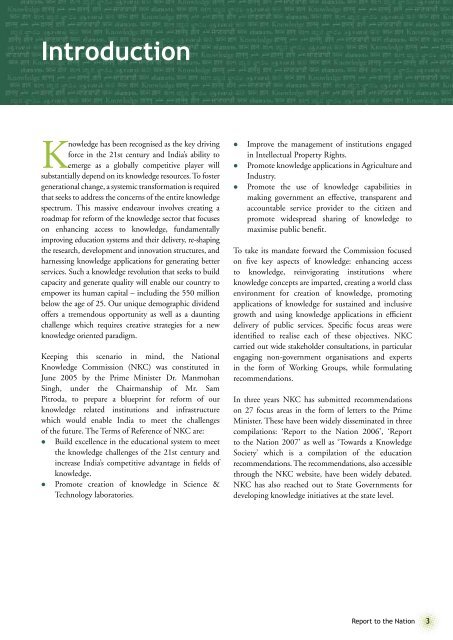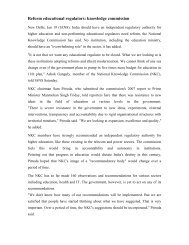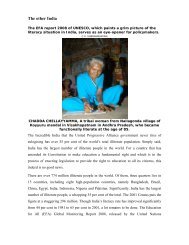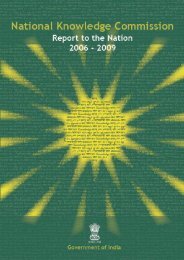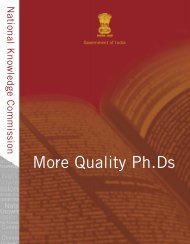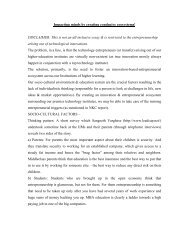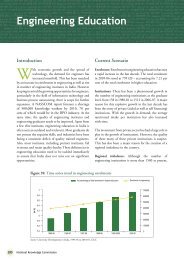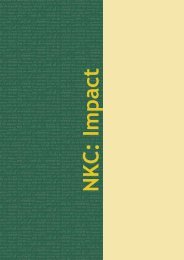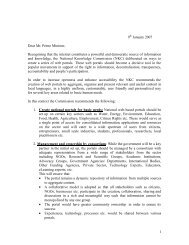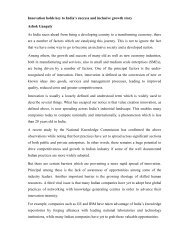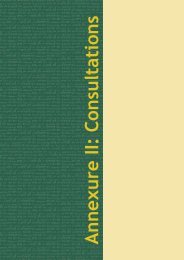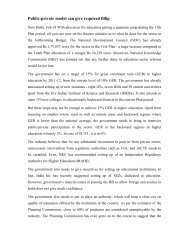National Knowledge Commission Report to the Nation 2009: Overview
National Knowledge Commission Report to the Nation 2009: Overview
National Knowledge Commission Report to the Nation 2009: Overview
You also want an ePaper? Increase the reach of your titles
YUMPU automatically turns print PDFs into web optimized ePapers that Google loves.
Introduction<br />
<strong>Knowledge</strong> has been recognised as <strong>the</strong> key driving<br />
force in <strong>the</strong> 21st century and India’s ability <strong>to</strong><br />
emerge as a globally competitive player will<br />
substantially depend on its knowledge resources. To foster<br />
generational change, a systemic transformation is required<br />
that seeks <strong>to</strong> address <strong>the</strong> concerns of <strong>the</strong> entire knowledge<br />
spectrum. This massive endeavour involves creating a<br />
roadmap for reform of <strong>the</strong> knowledge sec<strong>to</strong>r that focuses<br />
on enhancing access <strong>to</strong> knowledge, fundamentally<br />
improving education systems and <strong>the</strong>ir delivery, re-shaping<br />
<strong>the</strong> research, development and innovation structures, and<br />
harnessing knowledge applications for generating better<br />
services. Such a knowledge revolution that seeks <strong>to</strong> build<br />
capacity and generate quality will enable our country <strong>to</strong><br />
empower its human capital – including <strong>the</strong> 550 million<br />
below <strong>the</strong> age of 25. Our unique demographic dividend<br />
offers a tremendous opportunity as well as a daunting<br />
challenge which requires creative strategies for a new<br />
knowledge oriented paradigm.<br />
Keeping this scenario in mind, <strong>the</strong> <strong><strong>Nation</strong>al</strong><br />
<strong>Knowledge</strong> <strong>Commission</strong> (NKC) was constituted in<br />
June 2005 by <strong>the</strong> Prime Minister Dr. Manmohan<br />
Singh, under <strong>the</strong> Chairmanship of Mr. Sam<br />
Pitroda, <strong>to</strong> prepare a blueprint for reform of our<br />
knowledge related institutions and infrastructure<br />
which would enable India <strong>to</strong> meet <strong>the</strong> challenges<br />
of <strong>the</strong> future. The Terms of Reference of NKC are:<br />
• Build excellence in <strong>the</strong> educational system <strong>to</strong> meet<br />
<strong>the</strong> knowledge challenges of <strong>the</strong> 21st century and<br />
increase India’s competitive advantage in fields of<br />
knowledge.<br />
• Promote creation of knowledge in Science &<br />
Technology labora<strong>to</strong>ries.<br />
• Improve <strong>the</strong> management of institutions engaged<br />
in Intellectual Property Rights.<br />
• Promote knowledge applications in Agriculture and<br />
Industry.<br />
• Promote <strong>the</strong> use of knowledge capabilities in<br />
making government an effective, transparent and<br />
accountable service provider <strong>to</strong> <strong>the</strong> citizen and<br />
promote widespread sharing of knowledge <strong>to</strong><br />
maximise public benefit.<br />
To take its mandate forward <strong>the</strong> <strong>Commission</strong> focused<br />
on five key aspects of knowledge: enhancing access<br />
<strong>to</strong> knowledge, reinvigorating institutions where<br />
knowledge concepts are imparted, creating a world class<br />
environment for creation of knowledge, promoting<br />
applications of knowledge for sustained and inclusive<br />
growth and using knowledge applications in efficient<br />
delivery of public services. Specific focus areas were<br />
identified <strong>to</strong> realise each of <strong>the</strong>se objectives. NKC<br />
carried out wide stakeholder consultations, in particular<br />
engaging non-government organisations and experts<br />
in <strong>the</strong> form of Working Groups, while formulating<br />
recommendations.<br />
In three years NKC has submitted recommendations<br />
on 27 focus areas in <strong>the</strong> form of letters <strong>to</strong> <strong>the</strong> Prime<br />
Minister. These have been widely disseminated in three<br />
compilations: ‘<strong>Report</strong> <strong>to</strong> <strong>the</strong> <strong>Nation</strong> 2006’, ‘<strong>Report</strong><br />
<strong>to</strong> <strong>the</strong> <strong>Nation</strong> 2007’ as well as ‘Towards a <strong>Knowledge</strong><br />
Society’ which is a compilation of <strong>the</strong> education<br />
recommendations. The recommendations, also accessible<br />
through <strong>the</strong> NKC website, have been widely debated.<br />
NKC has also reached out <strong>to</strong> State Governments for<br />
developing knowledge initiatives at <strong>the</strong> state level.<br />
<strong>Report</strong> <strong>to</strong> <strong>the</strong> <strong>Nation</strong><br />
3


